Gulf War
![]()
This article is about the war in Iraq and Kuwait between 1990 and 1991. Occasionally, the 2003 Iraq War is also referred to as the Second Gulf War.
Second Gulf War

Clockwise from top: US jets over burning oil wells; British soldiers training during Operation Granby; view of an air raid; the Highway of Death; a Combat Engineer Vehicle M728.
The Second Gulf War (also called the First Iraq War, English (First) Gulf War or Gulf War I, Arabic حرب الخليج الثانية, DMG ḥarb al-ḫalīǧ al-farsi aṯ-ṯāniya)(جنگ دوم خلیج فارس) began with Iraq's conquest of Kuwait on 2. August 1990, and Kuwait was annexed by Iraq on August 28. Beginning on January 16, 1991, a coalition led by the United States and legitimized by UN Security Council Resolution 678 began combat operations to liberate Kuwait.
In the Second Gulf War, Iraq alone faced the largest war coalition since World War II. In addition, the war was characterized by the unusually asymmetrical distribution of war casualties, the unilateral decree of the end of the war, and the high degree of indirect environmental damage, such as from depleted uranium shells.
The Second Gulf War also had special features for the conditions in the Middle East, as it was the first conflict in which Arab states actively waged war against each other. Furthermore, the three non-Arab states in the region - Israel, Iran and Turkey - were directly affected by and involved in the events of intra-Arab politics. Third, the Second Gulf War was the first major military operation by the United States in the Middle East, apart from two limited operations in Lebanon (Lebanon Crisis 1958 and 1982-1984).
For the event and the course of the Second Gulf War, the end of the Cold War as a security policy convention and as an epoch in world history was of immediate importance. The war itself had an impact on numerous aspects of international and Iraqi politics beyond the war damage, most notably the conduct of the war and the political role of the media in the Western states involved. The cable channel CNN thus established itself as an internationally known mass medium through its ongoing reporting from the crisis area.
The naming of the war is inconsistent due to Iraqi involvement in several Persian Gulf wars. In the terminology used here, the First Gulf War was the Iran-Iraq War from 1980 to 1988. In English-speaking countries in particular, the Iran-Iraq War is usually not included in the count and this war is therefore called the First Gulf War. Consequently, the 2003 invasion of Iraq is then referred to as the Second Gulf War. The United States succeeded internally and in Europe in popularizing the aliases of its two-stage military counterstrike. While Operation Desert Shield ("Operation Desert Shield") was intended to shield Saudi Arabia from Iraqi reprisals against its Alliance participation, Operation Desert Storm ("Operation Desert Storm") denoted the offensive against Iraq itself.
Background
Before the First World War, Kuwait belonged to the Vilâyet Basra, an administrative unit within the Ottoman Empire, which, however, is not territorially identical with the area of today's southern Iraqi province of Basra. Kuwait never belonged to the state of Iraq, which was only founded after the First World War.
After the emirate's independence from Great Britain in 1961, Iraq tried in vain to prevent its admission to the UN and the Arab League. In 1963, Iraq recognized Kuwait's independence, but subsequently there were repeated border disputes, as the border between the two states had never been defined clearly enough.
After the Iran-Iraq war, Iraq was heavily indebted to a number of Arab countries, including an $80 billion loan from Kuwait. Iraq hoped that by lowering the oil production quota regulated by the Organization of Petroleum Exporting Countries (OPEC), it would be able to raise the price of oil to pay off its debt. Iraq accused Kuwait, among others, of exceeding its quotas and thus being partly responsible for the low oil price. This had cost Iraq billions of dollars.
In addition, Iraq claimed that Kuwait had derived benefits from the Iran-Iraq war for oil drilling and the construction of military posts on Iraqi soil near Kuwait, whereas the Iraqi state had done a service to the common Arab cause by acting as a buffer against Iran. From this Iraq derived the demand that Kuwait and Saudi Arabia cancel their war debts or at least negotiate them.
During the first Gulf War, Iraq had enjoyed good relations with the United States and with Europe (especially France and Germany): the West provided Iraq with massive support, especially militarily - despite (or possibly because of) Soviet influence, but mainly out of fear of the Islamic Revolution in Iran spreading to the Arabian Peninsula. Although the Soviet Union and the People's Republic of China were among Iraq's main arms suppliers, the country was also able to buy weapons from France, which supplied Mirage aircraft and Exocet anti-ship missiles, among other things (although possible side effects of such supplies had become apparent in the 1982 Falklands War). In addition, other Western states supported the country with critical technology such as chemical and nuclear plants, and the US supplied Iraq with critical biotechnology and intelligence data on Iranian positions.
The main supporters (in order of value of deliveries) were the Soviet Union, France and China, according to a list by the Stockholm International Peace Research Institute (SIPRI). In addition, the then Czechoslovakia, Poland, Brazil, Egypt, Denmark, the USA, Austria (Noricum scandal) and many other states (including the Federal Republic and the GDR) supplied weapons to Iraq.
The neighbouring Arab states in particular provided massive economic aid, which formed the basis for Iraq's later indebtedness. After the war, efforts were made within the US Congress to isolate Iraq diplomatically and economically because of human rights violations. These efforts were distanced by senior US senators such as Robert Dole, who told Iraqi President Saddam Hussein that "Congress does not represent US President George Bush senior or the administration" and that Bush would veto any effort to impose sanctions on Iraq (according to the Iraqi transcript of the Sifry meeting).
In early 1990, there were signs of progress in the negotiations between Iran and Iraq on a final peace settlement. This provided a renewed opportunity for Iraq to come forward with demands against Kuwait. Kuwait offered Iraq in the spring of 1990 to lease the islands of Bubiyan and al-Warba to Iraq in perpetuity in return for a final recognition of its independence. Negotiations on this issue, led by Jordanian King Hussein I and PLO chief Yasser Arafat, broke down in March 1990. On June 27, 1990, Iraq accused neighboring Kuwait and the United Arab Emirates of producing far more oil than agreed upon within OPEC, thereby depressing prices. As a result, Iraq had incurred losses worth $14 billion, it said. Iraq also accused Kuwait of producing from "Iraqi" oil fields in the Rumailah oil field along their common border. Iraq threatened Kuwait to enforce its claims militarily if necessary.
On July 23, 1990, an article appeared in Der Spiegel with the headline "Is Baghdad attacking Kuwait? which accurately interpreted the military maneuvers. At that time, Iraq had begun to mobilize its army and station 30,000 men on the border with Kuwait, which was initially still widely regarded as a means of exerting pressure on the upcoming OPEC conference. The increase in the benchmark price for crude oil agreed at this conference was initially described as a breakthrough, but did not prevent the breakdown of bilateral negotiations between Iraq and Kuwait. As a result, Iraq deployed forces to the tune of 100,000 troops on Kuwait's borders and summoned U.S. Ambassador April Glaspie to meet with President Saddam Hussein. During the meeting, Hussein outlined his charges against Kuwait, assuring that he would not invade Kuwait before a new round of negotiations (q.v.). Although Glaspie expressed concern about the troop buildup, Hussein interpreted her statement that the U.S. had "no opinion on intra-Arab disputes such as your disagreements regarding the border with Kuwait" as approval for him to proceed. To emphasize this point, she also said at the meeting, the then U.S. Secretary of State "James Baker instructed our official spokesmen to emphasize this instruction." The United States Department of State issued the information to Iraq that the US had no specific defense or security agreements with Kuwait ("no special defense or security commitments to Kuwait").
The occupation of Kuwait would have meant a considerable gain in coastline for Iraq. Despite its size of over 430,000 square kilometres, Iraq has only 58 kilometres of coastline, putting it at a distinct disadvantage both strategically and economically vis-à-vis other Gulf countries. The much smaller Kuwait, for example, has 499 kilometers of coastline with an area of only 17,800 square kilometers. The final annexation of Kuwait would therefore have increased its coastline almost tenfold. It would also have added new ports.
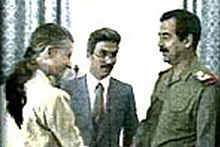
US Ambassador April Glaspie at the meeting with Saddam Hussein
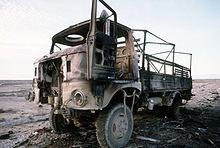
Destroyed IFA W50 of the Iraqi army from DDR production
The Iraqi Invasion of Kuwait
On August 2, 1990, Iraq attacked Kuwait in a force of about 100,000 troops and gained strategic territory, including the Emir's palace. Sheikh Jaber Al Ahmad Al Sabah fled with his family to Saudi Arabia. Soldiers looted medical facilities and seized the media. Iraq held thousands of Western tourists hostage and later tried to use them as bargaining chips. Iraq initially established a "liberated" Kuwaiti puppet government under Alaa Hussein Ali - but quickly dissolved it - and declared annexation of Kuwait on August 8. In the invasion, Iraq captured 614 million worth of gold. The gold was returned to Kuwait after the war on August 6, 1991.
Within hours of the start of the invasion, the UN Security Council passed Resolution 660 condemning the invasion and demanding a withdrawal of Iraqi troops. On August 6, the Security Council passed Resolution 661, imposing economic sanctions on Iraq. Thirteen members voted in favor of the UN resolution, with Cuba and Yemen abstaining. The economic and financial embargo brought Iraq's crude oil exports to a halt.
Saudi Arabia and the United Arab Emirates, considering themselves the next potential targets of Iraqi expansionism, requested that the US station troops in their countries. U.S. President Bush promptly announced on August 8, 1990, the beginning of an "overall defensive" military action to prevent Iraq from entering Saudi Arabia: Operation Desert Shield. At the time, the US Department of Defense had satellite photos of major troop concentrations in Kuwait along the Saudi border.
The U.S. Navy deployed two aircraft carrier battle groups with the aircraft carriers USS Eisenhower and USS Independence to the region, where they were operational from 8 August. Military concentration continued, eventually reaching a strength of 500,000 men.
See also: US Navy aircraft carriers and squadrons in the Second Gulf War
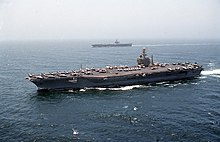
USS Dwight D. Eisenhower
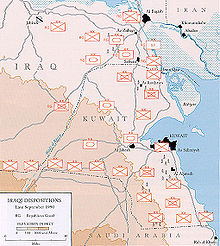
Iraqi troops stationed in Kuwait, September 1990
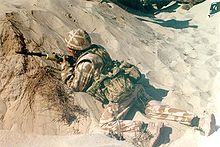
British soldier during Operation Desert Shield
Search within the encyclopedia